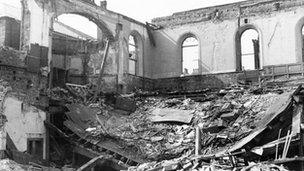Service in Hull to remember city's air raid dead
- Published

The city was bombed throughout the war and suffered more than 80 raids. Pic: English Heritage
A memorial service has been held at Hull's Northern Cemetery to remember the people killed in enemy air raids during World War II.
The city had 1,200 people killed and more than 3,000 seriously injured in 1939-45, according to official figures.
The remembrance service was lead by the Reverend Stephen Whaley.
It was attended by the Lord Mayor, Councillor Colin Inglis, with representatives of the emergency services and armed forces.
The scale of casualties and Hull's suffering is not well known outside the city as official contemporary reports usually referred to it as a "North-East coast town".
Local historian Alan Brigham said: "Hull was hidden from the press for morale reasons but the city didn't crack."
The authorities were worried about the effect of heavy bombing on the civilian population.
Unloading remaining bombs
Hull suffered numerous air raids because it was a port and it was on the way to other German targets such as Sheffield, Liverpool or Manchester.
The city was also be bombed by planes heading back to German bases unloading their remaining bombs after attacks on other cities.
Mr Brigham said; "The Humber estuary and the River Hull made the city a very easy target to navigate to and planes could be back over seas in minutes."
In Hull's heaviest raids more than 200 people were killed on each of two consecutive nights 7/8 May and 8/9 May 1941.
The city was under alert for more than 1,000 hours in total during the war.
Official statistics said 86,715 houses were damaged inside the city boundaries and only 5,945 were unscathed.
More than 150,000 people were temporarily homeless in the city during the war.
The city suffered the country's first daylight raid of the war in June 1940 and the last daylight land raid towards the end of the war in March 1945 said Mr Brigham.
- Published7 May 2011